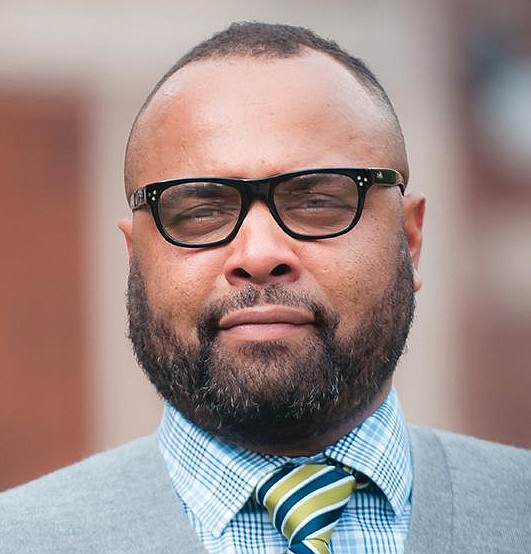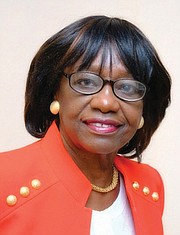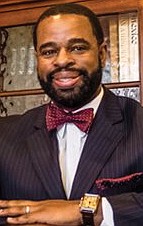Confluence of events propels record number of Black candidates to statewide office
Reginald Stuart | 4/8/2021, 6 p.m.
Historian Julian M. Hayter echoes in a phrase what many people say this election year is all about.
“It reflects the ‘blueification’ of the state,” said Dr. Hayter, an associate professor of leadership studies at the University of Richmond, when assessing why so many African-Americans are running for Virginia’s top offices — including three Black Democratic candidates for governor, one Republican and one Libertarian Party candidate.
A record 11 Black candidates are running statewide — for governor, lieutenant governor and attorney general. That number rises when people of color from other ethnic backgrounds are included.
“This is not your old Virginia,” said Dr. Hayter, noting that the state’s “political demographics” have changed dramatically from 32 years ago when voters in November 1989 chose then-Lt. Gov. L. Douglas Wilder as the state’s and nation’s first Black chief executive.
“Wilder could not have a racial agenda when he ran,” said Dr. Hayter. “It was a brilliant campaign,” he added.
He credited Mr. Wilder’s style with paving the political road and setting the stage for the eventual election of U.S. Sen. Barack Obama of Illinois to be president of the United States.
The “blueification” of Virginia today indicates the state “is no longer as politically conservative or racially conservative as it was. We are dealing with profound demographic shifts,” Dr. Hayter said, with a bottom line being a greater sense of confidence among the voting population that it is willing to vote for an African-American or a woman as governor.
One indication of the change at hand, said Dr. Hayter and, in separate interviews, his peers, is political power shifting to suburban areas around Northern Virginia, Hampton Roads and Richmond. “People think they have a shot,” he said.
With this year’s election season officially launching this month, many ballot box veterans and political observers wonder what has triggered this proliferation of Black candidates reflecting a variety of political persuasions — five for governor; three Black candidates for lieutenant governor (one Republican and two Democrats); and three Black candidates for attorney general (one Democrat and two Republicans).
“I guess (the candidates) look at this as an opportunity for change,” said Bernice Travers, former president of the Richmond Crusade for Voters, the oldest and largest Black voting action group in the state. “I’m trying to feel my way through this season,” Ms. Travers said.
Ditto, said many of her leadership peers. They collectively cite myriad developments converging to make this a big-time election year for Virginia. From the presidential term of businessman Donald Trump to last November’s national election results and the local impact of the global health pandemic, all are mentioned as motivating factors for candidates.
The pandemic also has been cited for the absence of neighborhood forums, door-to-door campaigning and leaflet drops in neighborhoods that typically help candidates get their message out. In person, face-to-face campaigning has been replaced by Zoom meetings and debates and email and social media messages purportedly from the advertised candidate, Ms. Travers and others said.
Ms. Travers noted she discards much of the emailed campaign material, especially requests seeking contributions.
“We want to get” the candidate’s pledge or promise “in writing,” said Ms. Travers. “We want to see them.”
With the phenomenal outcome of the contentious Georgia elections last fall and in January, and the victory and inauguration of U.S. Sen. Kamala Harris as vice president, “It’s our turn,” said attorney Lezli Baskerville, president and chief executive officer of the Washington-based National Association for Equal Opportunity in Higher Education, in speaking about the number of women seeking statewide office.
Ms. Baskerville said women have a track record of running households, political campaigns, nonprofits, small businesses and schools. “Now we have to run,” she said, noting fundraising may still be the weak spot in women’s political efforts. But they are getting a boost through online giving groups that never existed in prior decades, she said.
From a political point of view, analysts said the agonizing impact of the coronavirus pandemic and associated economic and political developments during the past year have set the stage for progressive leaders to continue their efforts.
Test. That’s the word Eric W. Claville, director of Norfolk State University’s Center for African American Public Policy, uses to describe this year’s elections in Virginia. Mr. Claville, who earned his undergraduate and law degrees at Southern University in Louisiana, characterized this year as “extremely significant” in several respects.
“It’s a test of this new Democratic wave of voters who are more apt to vote for candidates and policies that are less conservative and more progressive,” he said. “It’s a test of the new voters who have been added to the roles,” he said, noting the hundreds of thousands of new voters in the November presidential election 2020 and nearly 70,000 earlier this year when Gov. Ralph S. Northam restored the voting rights of Virginia felons who have completed their prison terms, even if they are on probation or parole.
For Republicans, it’s a test of whether the conservative movement “can recapture the party of Ronald Regan and George Bush after four years of Trumpism,” Mr. Claville said.
He said he has spoken briefly with nearly all the politicians seeking statewide office and has assessed the political mood. He and his peers generally agree that winning will take a statewide organization, money to communicate across the state and progressive ideas.
For sure, the issues aspiring leaders say they want to tackle are akin to the pre-pandemic years— job opportunities, equal and affordable housing, education equity and employment security.
Wendy Hobbs, president of the Goochland County Branch NAACP, said branch members have to sort through the election choices. Already, however, she said there is no doubt Black voters will want to select the next term of leaders who are committed to continuing and building upon the programs in place under Democratic Gov. Ralph S. Northam.
“The challenge for Black people is to know who’s running and listening to them,” said Ms. Hobbs, who has served as branch president for more than a decade. “Black voters will vote for whoever will represent them the best.”









